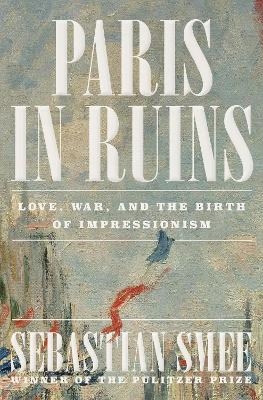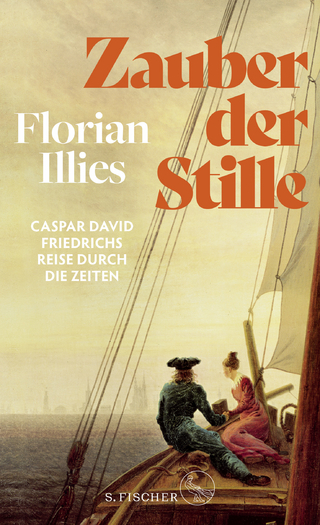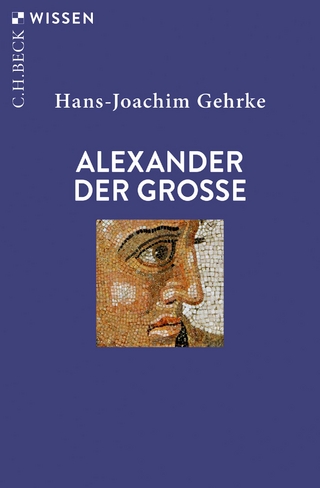
Paris in Ruins
Love, War, and the Birth of Impressionism
Seiten
2024
WW Norton & Co (Verlag)
978-1-324-00695-4 (ISBN)
WW Norton & Co (Verlag)
978-1-324-00695-4 (ISBN)
- Titel z.Zt. nicht lieferbar
- Versandkostenfrei innerhalb Deutschlands
- Auch auf Rechnung
- Verfügbarkeit in der Filiale vor Ort prüfen
- Artikel merken
A New York Times Book Review Editors' Choice, a Boston Globe “20 Books We Can’t Wait to Read This Fall” and a Next Big Idea Club “Must-Read Book for September 2024”
The Pulitzer Prize–winning art critic’s gripping account of the “Terrible Year” in Paris and its monumental impact on the rise of Impressionism.
From the summer of 1870 to the spring of 1871, famously dubbed the “Terrible Year” by Victor Hugo, Paris and its people were besieged, starved, and forced into surrender by Germans—then imperiled again as radical republicans established a breakaway Commune, ultimately crushed by the French Army after bloody street battles and the burning of central Paris. As renowned art critic Sebastian Smee shows, it was against the backdrop of these tumultuous times that the Impressionist movement was born—in response to violence, civil war, and political intrigue.
In stirring and exceptionally vivid prose, Smee tells the story of those dramatic days through the eyes of great figures of Impressionism. Édouard Manet, Berthe Morisot, and Edgar Degas were trapped in Paris during the siege and deeply enmeshed in its politics. Others, including Pierre-August Renoir and Frédéric Bazille, joined regiments outside of the capital, while Claude Monet and Camille Pissarro fled the country just in time. In the aftermath, these artists developed a newfound sense of the fragility of life. That feeling for transience—reflected in Impressionism’s emphasis on fugitive light, shifting seasons, glimpsed street scenes, and the impermanence of all things—became the movement’s great contribution to the history of art.
At the heart of it all is a love story; that of Manet, by all accounts the father of Impressionism, and Morisot, the only woman to play a central role in the movement from the start. Smee poignantly depicts their complex relationship, their tangled effect on each other, and their great legacy, while bringing overdue attention to the woman at the heart of Impressionism.
Incisive and absorbing, Paris in Ruins captures the shifting passions and politics of the art world, revealing how the pressures of the siege and the chaos of the Commune had a profound impact on modern art, and how artistic genius can emerge from darkness and catastrophe.
The Pulitzer Prize–winning art critic’s gripping account of the “Terrible Year” in Paris and its monumental impact on the rise of Impressionism.
From the summer of 1870 to the spring of 1871, famously dubbed the “Terrible Year” by Victor Hugo, Paris and its people were besieged, starved, and forced into surrender by Germans—then imperiled again as radical republicans established a breakaway Commune, ultimately crushed by the French Army after bloody street battles and the burning of central Paris. As renowned art critic Sebastian Smee shows, it was against the backdrop of these tumultuous times that the Impressionist movement was born—in response to violence, civil war, and political intrigue.
In stirring and exceptionally vivid prose, Smee tells the story of those dramatic days through the eyes of great figures of Impressionism. Édouard Manet, Berthe Morisot, and Edgar Degas were trapped in Paris during the siege and deeply enmeshed in its politics. Others, including Pierre-August Renoir and Frédéric Bazille, joined regiments outside of the capital, while Claude Monet and Camille Pissarro fled the country just in time. In the aftermath, these artists developed a newfound sense of the fragility of life. That feeling for transience—reflected in Impressionism’s emphasis on fugitive light, shifting seasons, glimpsed street scenes, and the impermanence of all things—became the movement’s great contribution to the history of art.
At the heart of it all is a love story; that of Manet, by all accounts the father of Impressionism, and Morisot, the only woman to play a central role in the movement from the start. Smee poignantly depicts their complex relationship, their tangled effect on each other, and their great legacy, while bringing overdue attention to the woman at the heart of Impressionism.
Incisive and absorbing, Paris in Ruins captures the shifting passions and politics of the art world, revealing how the pressures of the siege and the chaos of the Commune had a profound impact on modern art, and how artistic genius can emerge from darkness and catastrophe.
Sebastian Smee is a Pulitzer Prize–winning art critic at the Washington Post and the author of The Art of Rivalry. Formerly the chief art critic at the Boston Globe and national art critic for the Australian, he has also written for the Daily Telegraph, Guardian, Financial Times, and the Independent, among other publications. He lives in Boston.
| Erscheinungsdatum | 29.08.2024 |
|---|---|
| Zusatzinfo | 8 page insert, 20 color images |
| Verlagsort | New York |
| Sprache | englisch |
| Maße | 163 x 236 mm |
| Gewicht | 661 g |
| Themenwelt | Literatur ► Biografien / Erfahrungsberichte |
| Kunst / Musik / Theater ► Kunstgeschichte / Kunststile | |
| Technik ► Architektur | |
| ISBN-10 | 1-324-00695-1 / 1324006951 |
| ISBN-13 | 978-1-324-00695-4 / 9781324006954 |
| Zustand | Neuware |
| Informationen gemäß Produktsicherheitsverordnung (GPSR) | |
| Haben Sie eine Frage zum Produkt? |
Mehr entdecken
aus dem Bereich
aus dem Bereich
Caspar David Friedrichs Reise durch die Zeiten
Buch | Hardcover (2023)
S. Fischer (Verlag)
25,00 €
Geschichte, Positionen, Perspektiven
Buch | Softcover (2024)
C.H.Beck (Verlag)
12,00 €


